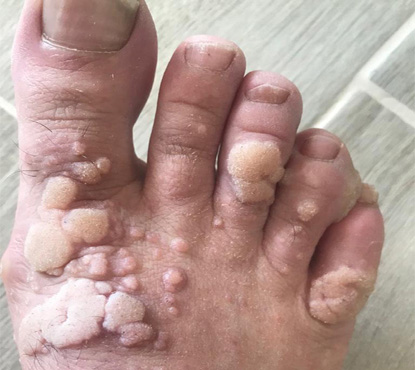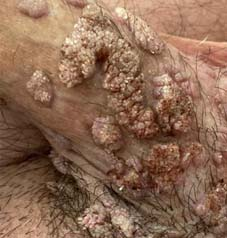FOOT WARTS

What are foot warts?
Foot warts are small, hard, rough skin growths that usually occur on the soles and toes of the feet. They are usually painless but can cause pain or discomfort due to their location and size.
What causes foot warts?
Foot warts are caused by a type of virus called the Human Papilloma Virus (HPV). The virus can spread through small cracks and wounds in the skin.
What do foot warts look like?
Foot warts usually have a hard, raised, and rough surface and are the same color or darker than the surrounding skin. They are typically found on the sole of the foot and sometimes contain black dots. They can sometimes be confused with corns. Foot warts are generally level with the skin or slightly elevated, have ill-defined borders, are hard and often painful tissue rings. They usually contain black dots in the center, which form as a result of blocked blood vessels. On the other hand, corns are typically hard, thick, yellowish or grey spots, and they usually occur on the bottom or sides of the feet, especially on and around the toes. Corns are generally painless, but very large or deep corns can cause pain.
Are foot warts contagious and what are the modes of transmission?
Yes, foot warts are contagious. They can spread from person to person through direct skin contact or shared surfaces. Walking barefoot in public places, especially changing rooms and swimming pools, increases the risk of transmission.
Can foot warts be seen at any age?
Yes, foot warts can be seen at any age. However, children and teenagers, those with weak immune systems, and those who have never been exposed to the HPV virus are more susceptible.
Do foot warts disappear on their own?
Yes, in some cases foot warts can disappear on their own. However, this usually takes time and can sometimes take years. Most warts are stubborn and require treatment.
What treatment methods are available for foot warts?
At our Wart Treatment Center in Silivri, all methods are used to treat foot warts. We generally prefer fractional laser because this treatment usually gives faster results and yields results in a single session. Also, fractional laser treatment affects healthy skin to a lesser degree, which accelerates the healing process and reduces the risk of complications.
However, each wart is different and in some cases, alternative treatment methods like radiofrequency or electrocautery may be more suitable. Radiofrequency can be effective in treating deep or large warts depending on the size and location of the warts. Electrocautery works by using an electrical current to burn the warts.
Each treatment approach has its own advantages and potential risks. Therefore, the choice of the most suitable treatment method depends on the type, size, and location of the wart, the patient's general health condition, and personal preferences. Taking all these factors into account, we determine your treatment plan according to your individual needs.
What are the side effects of foot wart treatments?
Laser treatment, electrocauterization, and radiofrequency can often cause pain, redness, swelling, bruising, and skin discoloration. More rarely, infection, scar formation, and loss of sensation in the treated area can be seen. Topical treatments can often cause skin irritation, redness, burning, itching, or peeling, and can also lead to skin irritation by affecting the surrounding healthy skin. The side effects of cryotherapy are usually pain, redness, swelling, and bruising; in more severe cases, there can be permanent color change in the skin or scar formation. While cantharidin is a painless application, the blistering and peeling process can be painful. Rarely, infection can be seen in the area where the application is made. Immunotherapy usually leads to mild and temporary side effects, which include redness, blisters, itching, or peeling on the skin. More serious side effects may include systemic reactions or pain at the vaccine application site.
What happens if foot warts are not treated?
Untreated foot warts generally grow larger and can spread. They can also cause discomfort and pain and can affect walking. Warts on the foot can also spread to the hands over time. Also, if foot warts are not treated, they can spread to other family members over time.
How can I prevent foot warts?
To prevent the spread of foot warts, keep your feet dry and clean, change sweaty socks, wear slippers in public places, avoid touching warts directly, and use bandages on cuts or wounds.
Can foot warts be treated at home?
Home wart treatment methods include over-the-counter topical medications. However, such medications often lead to wasting time and warts spreading more.
How do I know if my foot warts are getting worse?
Foot warts usually grow and spread over time. If the warts continue to grow, cause pain, bleed, or change color, this indicates that the warts are getting worse.
Is there a connection between foot warts and hand warts?
There is a direct connection between hand warts and foot warts because both types of warts are formed by the Human Papilloma Virus (HPV). There are hundreds of types of this virus, and different types cause different types of warts. However, certain types of HPV are usually responsible for hand and foot warts.
Both types of warts are highly contagious. It is possible to transfer warts from hands to feet, or from feet to hands.
It is also important to remember that HPV can easily be transmitted to others. This usually happens through direct skin-to-skin contact or by sharing a surface (such as a common towel, shoe, or swimming pool). Therefore, it is important to pay attention to hygiene rules to prevent wart formation and to avoid direct contact with warts.
Are foot warts more common in children?
Yes, foot warts are more common in children and teenagers. Children often do not wear shoes to protect their feet or frequently walk barefoot, making them more vulnerable. Additionally, children's immune systems are generally less developed than adults', making them more susceptible to warts.
How is the diagnosis of foot warts made?
A doctor specializing in warts usually diagnoses warts by looking at their appearance. In cases of doubt, a skin biopsy is performed.
Do foot warts cause cancer?
Foot warts do not cause cancer.
Is there a relationship between foot warts and the immune system?
Yes, there is a relationship between the immune system and warts. People with weak immune systems are more susceptible to warts, and it is more difficult to treat warts.
Does the HPV vaccine prevent foot warts?
The HPV vaccine provides protection against certain types of human papilloma virus (HPV) that usually cause genital warts and some types of cancer. Existing HPV vaccines provide protection against HPV types that usually cause cervical cancer, vulvar cancer, vaginal cancer, head and neck cancers, and anogenital warts. HPV vaccines also provide protection against HPV types 6 and 11, which typically cause the formation of genital warts.
However, the types of HPV that commonly cause foot warts (typically HPV type 1, 2, 4, 27, and 57) are not included in HPV vaccines. Therefore, HPV vaccines do not provide protection against foot warts.
Can foot warts cause any complications?
Foot warts generally do not cause serious complications. However, large or painful warts can make walking difficult. Also, scratching or picking at warts can cause the warts to spread to other places.
Who should I see for foot warts treatment?
The diagnosis and treatment of foot warts are performed by specialist doctors experienced in this field. If you have foot warts and want to get treatment, you can apply to our Wart Treatment Center in Silivri. Our center, under the management of Op. Dr. Eser Ağar, has comprehensive experience and equipment in the diagnosis and treatment of warts. Along with our expert team, we carry out your foot warts treatment in a safe and effective way. If deemed necessary, we can apply various modern treatment options such as laser treatment, radiofrequency, electrocauterization. If you want more information about foot warts, you can call our number 0505 260 72 38. To get preliminary information about the treatment process and prices, you can send a clear photo of your warts to the phone number 0 850 490 14 78. We get in touch with you, evaluate your situation and determine the most appropriate treatment method. Don't hesitate to contact us with any questions, we are here to help you.
What are the prices for foot warts treatment?
The prices for foot warts treatment vary according to the prevalence of warts, their sizes and the anesthesia to be applied. Our treatment fees are not secret. You can reach us from our numbers 0505 260 72 38 and 0 850 490 14 78, and get information about the treatment process and prices from our staff specializing in warts. To get information about prices, you can send a clear photo of your warts to the phone number 0 850 490 14 78. We get in touch with you, evaluate your situation and determine the price.
What should be taken into account after foot warts treatment?
After foot warts treatment, it is very important to take care of the treated area. Try to keep the area clean and dry. The treated area can be painful for the first few days; you can use painkillers. If the wart does not completely pass or if the symptoms do not improve, it is important to come back for a check-up. Also, to prevent the recurrence of warts, pay attention to your personal hygiene. Be careful to wear shoes in public areas and not to share your shoes.
Is there a risk of recurrence after foot warts treatment?
After the treatment of foot warts, there is a risk of recurrence of the treated warts. Foot warts, even though they appear on the top layer of the skin, the actual cause, the human papillomavirus (HPV) lives under the skin. The treatment only destroys the visible warts. Therefore, the recurrence of warts actually means the emergence of new warts caused by HPV, which continues to exist under the skin.
You can take certain precautions to prevent this. Firstly, it is important to avoid walking barefoot in communal areas. Also, you should be careful not to share your personal items (towels, slippers, shoes, etc.) with others. Paying attention to foot hygiene, washing your feet regularly and drying them is also important. These precautions help to prevent the spread of the virus and the formation of new warts.
This article may also interest you

Warts on the penis can spread and pass to the breech area. If rectal warts occur, the risk of anal cancer increases.
Read more

 TR
TR EN
EN